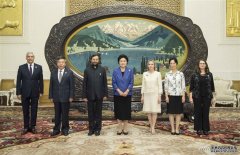China Focus: Clapper talk, calligraphy changing bilingual ed
by Xinhua writers Jia Zhao and Huang Xiaoxi
KASHGAR, Xinjiang, Oct. 6 (Xinhua) -- Batur Mamut was moved to tears while watching his daughter's "clapper talk" performance in fluent Putonghua (standard Chinese).
"I am just extremely happy to see my child speaking Putonghua so well," said the 51-year-old taxi driver from Shufu County in northwest China's Xinjiang Uygur Autonomous Region.
Most villagers his age in Kashgar's remote rural areas only speak Uygur language, which has been a common barrier for those who seek jobs in eastern cities.
However, among the younger generation that situation is quickly changing, as children are becoming bilingual from as early as kindergarten age.
Batur Mamut's daughter Nursebi Batur is a fourth grader at the central primary school in Tokkuzak Township.
The story she performed in clapper talk, a traditional Chinese form of narrative singing accompanied by a pair of clappers, was about the changes that have taken place in the school since 2014.
In April 2014, Chinese President Xi Jinping visited the school and told teachers that it is important to facilitate bilingual education for children from China's ethnic minority groups.
If they can master standard Chinese, it will be easier for them to find jobs, and more importantly, contribute to national unity, according to Xi.
Following the president's instruction, the school and education authorities have taken many steps to boost the children's bilingual abilities.
More and more courses are being taught by bilingual teachers and new styles of learning are being explored, including clapper talk, which requires performers use bamboo clappers to mark the beats.
The folk art is not easy, but the students were very interested in practicing spoken Putonghua with it, said Yao Hongyu, secretary of the school's Party branch.
The rhymed Putonghua lyrics made it easy to remember and the Uygur students are born with a natural sense of rhythm to become quick learners, according to Yao.
The school has also built a dedicated calligraphy classroom decorated with traditional Chinese elements.
Nursebi Batur enjoys calligraphy and said becoming a calligraphy teacher would be her ideal job after finishing college.
Calligraphy courses not only teach students the correct sitting posture and writing style, but also enable them to discover the beauty of Chinese characters, said Yao.
Besides Putonghua, teaching of Uygur language was also strengthened following the introduction of standard textbooks in the region.
To monitor the quality of bilingual education, a teaching evaluation system had been expanded to cover the studies of both Putonghua and Uygur languages, according to an action plan released in 2016.
Besides learning the languages, students at the township school also had classes on their ethnic arts, including Uygur dancing, singing and the unique music instruments in Kashgar.
The changes are not only occurring at primary schools, as Xinjiang is striving to offer universal bilingual education from kindergarten to the end of senior high school.
As of September, about 1,176,200 rural preschoolers were receiving free bilingual education and the coverage was nearly 100 percent in rural areas, according to the region's education authority.
More than 61,000 new Putonghua speaking teachers have been employed by rural kindergartens, primary and middle schools in the past five years.
In 2014, there was no teachers of Han ethnicity, China's dominant ethnic group, at Tokkuzak's central primary school. When the autumn semester began this September there were 10.
Most came from other provincial regions and are learning Uygur language in their spare time.
Han teachers did it voluntarily to better communicate with parents who don't speak Putonghua and understand local community and culture, said Yao.
Seeing their children's progress has also encouraged parents like Batur Mamut to improve his Putonghua, by sitting in primary school classes or attending night school in the village.
"Putonghua is the common language shared by all ethnic groups in this country. We should learn it," said Batur Mamut.















